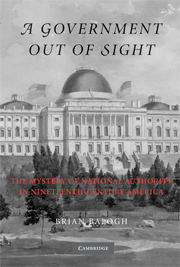Book contents
- Frontmatter
- Contents
- Acknowledgments
- 1 Introduction: Why Look Back?
- 2 How Americans Lost Sight of the State: Adapting Republican Virtue to Liberal Self-Interest
- 3 Between Revolutions: The Promise of the Developmental Vision
- 4 “To Strengthen and Perpetuate that Union”: Republican Political Economy
- 5 Outside the Boundaries: “Powers and Energies in the Extreme Parts”
- 6 The Uncontested State: Letters, Law, Localities
- 7 Restoring “Spontaneous Action and Self-Regulation”: Civil War and Civil Society
- 8 Judicial Exceptions to Gilded Age Laissez-Faire
- 9 “A Special Form of Associative Action”: New Liberalism and the National Integration of Public and Private
- 10 Conclusion: Sighting the Twentieth-Century State
- Index
4 - “To Strengthen and Perpetuate that Union”: Republican Political Economy
Published online by Cambridge University Press: 05 August 2012
- Frontmatter
- Contents
- Acknowledgments
- 1 Introduction: Why Look Back?
- 2 How Americans Lost Sight of the State: Adapting Republican Virtue to Liberal Self-Interest
- 3 Between Revolutions: The Promise of the Developmental Vision
- 4 “To Strengthen and Perpetuate that Union”: Republican Political Economy
- 5 Outside the Boundaries: “Powers and Energies in the Extreme Parts”
- 6 The Uncontested State: Letters, Law, Localities
- 7 Restoring “Spontaneous Action and Self-Regulation”: Civil War and Civil Society
- 8 Judicial Exceptions to Gilded Age Laissez-Faire
- 9 “A Special Form of Associative Action”: New Liberalism and the National Integration of Public and Private
- 10 Conclusion: Sighting the Twentieth-Century State
- Index
Summary
To judge by the size of the nation's capital, President Thomas Jefferson would have little trouble delivering on his promise to keep the federal government “rigorously frugal & simple.” The grand plans for Washington, D.C., stood unfinished, federal buildings dilapidated. Even in the heart of the capital, government remained relatively invisible. Including the President, only 153 federal employees worked in Washington when Jefferson assumed office. Over the next thirty years, the number barely doubled, despite a 150 percent increase in the nation's population.
Illustrating just why advocates of the Constitution had fought for the exclusive right to levy imposts, Jefferson asked rhetorically, “What farmer, what mechanic, what laborer ever sees a taxgatherer of the United States?” Under Jefferson, Congress eliminated the direct tax and slashed most excise taxes, collecting 90 percent of federal revenues through customs duties. Now that they were in office, and especially because they presided over a surplus, Republicans were less eager to make taxpayers “feel” the pain of financing the General Government. Republicans refused to recharter the Bank of the United States when its twenty year charter expired in 1811. Federally funded internal improvements also came in for their share of opposition; critics charged that such projects threatened to empower the government, burden the taxpayer, redistribute wealth from one locale to another, and become self-perpetuating instruments of distant control over independent citizens.
Given the localistic nature of American society and the growing importance of individual choice at the end of the eighteenth century, what would bind the nation together? Because Jefferson embraced both localism and individual rights, it is worth examining his views on these matters.
- Type
- Chapter
- Information
- A Government Out of SightThe Mystery of National Authority in Nineteenth-Century America, pp. 112 - 150Publisher: Cambridge University PressPrint publication year: 2009



